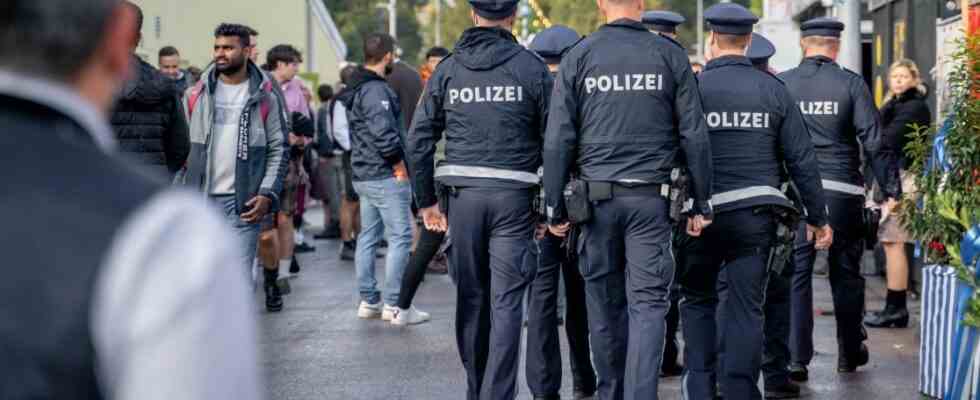Christian Schäfer experienced it himself on Monday evening: the police were called to a Oktoberfest brawl. As soon as the officers take the criminal into custody, they are surrounded by people. Mobile phones are pulled out, people scold – at the police. “Before, during the fight – nobody got involved,” says Schäfer. The 40-year-old police chief has been a police officer for 20 years. And now a debutant. For the first time he leads the Wiesnwache of the Munich Presidium, with around 600 officers for 17 days, the largest office in Bavaria.
Some things can be seen more clearly with a little distance. As a newbie. And after a two-year Oktoberfest break. The rapidly eroding respect for state security forces, for example, although the Penzberg-born shepherd already knows that from his work as deputy head of police inspection 14, which is called “Westend” but is based in Beethovenstrasse. So the Wiesn environment is not that foreign to him.
And it’s not the colleagues who work around the beer tumult either. Of course, this helps communication and cooperation between the Wiesn guard and the neighboring inspector, says Schäfer. And within the Wiesnwache, which is housed in the administration yard behind the Schottenhamel tent? There is a clear division of tasks between uniformed security police, who should be out and about on the festival grounds as much as possible, and the police officers at the station, to whom the delinquents are then taken through the back entrance. The specialized investigators have to be all-rounders at the Wiesn – the expert for online fraud is sometimes given a beer mug. Lots of new stuff there too.
But everyone who is on duty at the station does so voluntarily. “And with joy and commitment,” as her boss says. That also applies to him. Anyone who sees him sitting in his office in the basement of the administration yard, talking about the work of his colleagues and with sparkling eyes about the first days at the Wiesn, will be happy to believe the “pride and joy” he felt when it was finally decided two months ago that he should take over the management of the Wiesnwache.
“That would make a funny picture”
Everything that serves to prevent Covid at the police station is also voluntary: wearing a mask, testing before starting work. Even festival visitors are only asked to put on a mouth and nose protector in the guard room. Most do. “At least those who come through the front door,” says Schäfer. “They want something from us.” The others, the delinquents who are brought in through the back door, are usually more recalcitrant. Just disrespectful, in connection with a lot of alcohol. And for safety reasons, they are not allowed to wear masks in the cell anyway.
Everything new: For the first time, Chief Police Officer Christian Schäfer, 40, is in charge of the Munich Wiesnwache. For 17 days this is the largest police station in the Free State.
(Photo: Florian Peljak)
At the front, on the counter, plexiglass panes were subsequently screwed on. In addition to the officials wearing masks, this is one of the few indications that the first Oktoberfest since the beginning of the pandemic is far from being a post-Covid Oktoberfest. Spot checks have shown that one in 50 visitors could be infected. A potential superspreader at every fifth beer table – how do the police deal with it? At first glance: business as usual. The police officers who are in groups of six on the festival grounds usually do not wear masks. “That would be a funny picture,” says her boss. Keyword proximity.
But as a rule, the groups don’t even have to venture into the threatening aerosol clouds of the festival tents. The police had around 2000 operations at the Oktoberfest 2019. And only 42 of them led the officers into one of the tents. Offenders are usually handed over to the police by security in the open air. Nevertheless, Schäfer also assumes that corona-related failures will probably be unavoidable, especially in the second week of the Oktoberfest. Provisions have been made for this, and a replacement is available.
But – and this is where voluntariness comes into play again: the head of the Oktoberfest guard firmly believes that his colleagues themselves would have a great interest in not getting sick. 50 percent of his team are Oktoberfest newcomers like their boss. Mostly young officers who are looking forward to experiencing other operations at the Wiesn after two years of Corona, with everything that makes the police officer profession interesting for them. But with the background noise of ride sound and band animation in the ear and the smell of roasted almonds and fish on a stick in the nose.
More attacks on police officers
The Wiesn 2022 is a bit different, Schäfer believes he has observed on the first few days. Fewer older people, comparatively more younger ones, many of them probably also Oktoberfest newcomers with correspondingly little experience with when enough is really enough for them. At halftime on Sunday, Schäfer says: “We were actually surprised that the first week was so quiet.”
Of course, the experienced police officer admits, he too is looking forward to the final accounts after October 3rd. How the numbers are compared to the pre-Corona Oktoberfest. Fewer crimes and fewer violent crimes? But maybe more alcoholized? And also more attacks on police officers? The experiences of the first few days, which Schäfer himself had to make, indicate this.
He doesn’t want to spoil the joy of playing at the Wiesn. Even if he can hardly find time to stroll around the Theresienwiese privately. Being the chief of police at Oktoberfest is a full-time job. “In the mornings I’m often a kind of tourist guide,” says Schäfer. “Then I can show delegations and other interested parties our Oktoberfest guard.” On Family Day, Christian Schäfer nevertheless reserved a few hours for a stroll with his own offspring.

